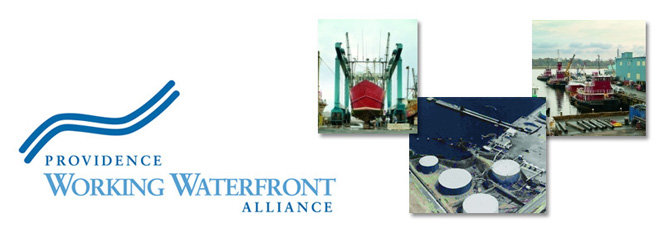This week, the Providence Journal ran two editorials both arguing strongly for growing Rhode Island’s ports.
Edward Achorn: Growing hope for R.I. ports:
Not every state is fortunate enough to have one of America’s largest protected waterways, to be very near the sea lanes from Europe and to be between Boston and New York, part of the country’s greatest concentration of population. Leaders of many a landlocked state would love to have an opportunity to boost their economies through the booming business of international trade.
But Rhode Island has lacked the leadership to exploit its great advantages, in part because powerful NIMBY voices — people who have theirs, and do not want their views or highways cluttered with jobs and economic activity — have succeeded in scaring off development. Indeed, even the economic engines we have, such as the Port of Providence, are under attack by developers who would like to replace gritty working ports with marinas and condominiums, which put money in the developers’ pockets but end up starving the region of high-paying blue-collar jobs.
Fortunately, this pony is not alone. Last week, the General Assembly created a new commission to study ramping up port facilities. That may help blow on the little spark of hope until it becomes a sustainable fire, and the Ocean State can finally exploit its economic strengths.
Editorial: Propelling the ports:
While Governor Carcieri shrugs off an important opportunity to bring jobs to Rhode Island, the General Assembly is trying to stir the pot — or, rather, port. The legislature commendably created a special commission to study ports at Quonset Point and Providence, seeking to maximize the use of those sites.
More than a decade ago, Governor Almond pushed for a $3 billion deep-sea containerized-cargo project at Quonset Point that would have dramatically boosted the region’s economy. From the time he was a candidate, Governor Carcieri frowned on the idea. He says there is no interest in the private sector in such a port. But surely one reason there is no interest is that the governor frowns on the idea. Other states’ governors, working aggressively to attract jobs, have been big supporters of port expansion.
And no wonder. Freight volumes in the United States are expected to leap 50 percent by 2020, and containerized-cargo shipping is growing even faster, according to the U.S. Committee on the Marine Transportation System. As the U.S. Army Corps of Engineers puts it: “Containerized trade is the fastest growing segment of the economy, doubling every 10 years, which means a steady increase in the number of vessels calling on U.S. ports. In turn, that means more jobs and a stronger economy.”
Such new approaches as short-sea shipping, helping to draw truck traffic off our clogged highways, are also in the works. And with the widening of the Panama Canal, port activity along the East Coast is expected to boom, since it is often faster and easier, and thus cheaper, to move goods straight from Asia by ship than to unload on the West Coast and transfer those goods across the country by train or truck.
At the same time, Rhode Island is close to both the European shipping lanes and in the most heavily populated stretch of the United States, and its infrastructure of highways, rail lines and air transport is superb. Any state that fails to capitalize on such advantages is being absurdly shortsighted.
Whether that translates into a full containerized-cargo port at Quonset, or something on a more modest scale, the legislature is right to seek out the experts and develop a plan of action.
The well-paying jobs associated directly with ports — and indirectly, throughout the region, with cheaper, quicker transportation — are greatly needed in a state with one of America’s highest unemployment rates. More jobs mean more opportunities, and more tax revenue to support public services.

